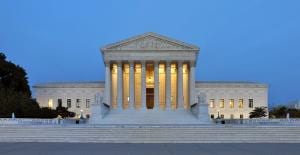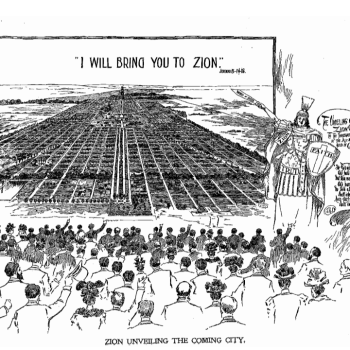 Why do subsets of Americans care so much about the Supreme Court? Most Americans would be hard pressed to name more than two or three members of the Court, let alone assess its recent jurisprudence. At the same time, political passions surrounding the Court reach a fever pitch with each nomination.
Why do subsets of Americans care so much about the Supreme Court? Most Americans would be hard pressed to name more than two or three members of the Court, let alone assess its recent jurisprudence. At the same time, political passions surrounding the Court reach a fever pitch with each nomination.
It has been rare in recent U.S. history for a political party to hold majorities in both branches of Congress and the presidency at the same time. And such power is often fleeting. For instance, if Democrats take control of the Senate in the 2020 election, there’s a good chance they will lose at least one of two chambers in 2022. And, at least for now, legislation must clear a sixty-vote threshold in the Senate. Presidents possess enormous power, but their term lasts four years, and although both the current and past presidents have exercised power in unconstitutional ways, they often find themselves impeded by the courts.
By contrast, the Supreme Court is the arbiter of last resort in our country. It has become the branch of government that adjudicates many of our most pressing political and moral questions: abortion, same-sex marriage, and health care, to name only a few examples. Its justices hold lifetime appointments. Because of this concentration of power, progressives and conservatives alike fear the consequences should the other side obtaining a durable majority.
Both sides envision apocalyptic scenarios that seem realistic to them: progressive justices using protections for gay, lesbian, and transgender individuals to harass or shut down religious institutions; conservative justices banning abortion across the country.
Outside of those who believe in them, these scenarios seem absurd. Many conservatives want to outlaw or severely restrict abortion, but reversing Roe would not outlaw abortions across the country but return decision-making about abortion to states. Some progressives want to strip tax-exempt status from religious colleges and universities opposed to same-sex intercourse and marriage, but we are a long way from a liberal Court stripping BYU or Wheaton of access to federal funds. How many times have we heard that the progressive or conservative sky is going to fall with the success or failure of a single Supreme Court nomination?
I am not suggesting that Supreme Court appointments don’t matter. They do, in part because we have ceded ultimate authority on our most pressing moral questions to the Supreme Court. And Bush v. Gore.
But the fears are so outsized. In many ways, moreover, those fears are rooted within the American constitutional order itself. No one wants to be a minority in a democracy, because majorities rule.
In Federalist Papers #51, James Madison addressed this problem. Madison predicted that “in the extended republic of the United States … a coalition of a majority of the whole society could seldom take place on any other principles than those of justice and the general good.” There would be so many factions spread out across a large country that no single faction could gain control. “The society itself,” he reasoned, “will be broken into so many parts, interests, and classes of citizens, that the rights of individuals, or of the minority, will be in little danger from interested combinations of the majority.”
Federalist 51 is one of my favorite texts. Madison started with the premise that men are not angels. Therefore, both governments and checks on governmental are needed. And he was not wrong about the benefits of an extended republic (with separation of powers and a complicated system of checks and balances). Still, one only has to glance at the sectional crisis of the mid-nineteenth century to recognize how terrified Americans could become at the thought of finding themselves at the mercy of a majority.
During this time period, religious minorities also often found themselves at the mercy of local, state, or national minorities. In his recent Kingdom of Nauvoo, Benjamin Park discusses the ways that minority groups revealed the discontents and frailties of American democracy in the 1830s and 1840s. Religious, racial, and political minorities – whether Catholic, Mormon, abolitionist, Native — found themselves trampled on by majorities. The Latter-day Saints gave up on American democracy because they could get no redress for the wrongs done to them and could not find a way to protect themselves from mobs in Illinois. Park ably narrates their fears, and he also illustrates that non-Mormons in both Missouri and Illinois reasonably feared that local Mormon majorities would mistreat them in turn. Americans feared being in the minority because the American system did not protect minority rights.
People still aren’t angels, but while the United States today has far more protections for minorities of all sorts. Still, that basic fear of being trampled by a majority remains. Sometimes for good reason. Race in America remains the prime example.
But in many other instances, fears are overblown. When Republicans win national elections, progressives predict the imminent imposition of a Christian theocracy. Witness Kevin Phillip’s American Theocracy (2006). Admittedly, Phillip’s argument was somewhat more sophisticated than his title, but any suggestion that Christian Reconstructionists have ever been on the brink of imposing theocracy on American society is baffling.
And if progressive believe their worst nightmares about Republican governance, one shudders to peak at the nightmares of many conservatives about Democratic power. In that hell dream, we’re always one election away from an American politburo and the extinction of religious freedom.
One Supreme Court appointment will not bring about a political and cultural apocalypse. Regardless of the power politics of the moment, in the long run the balance of authority on the Supreme Court hinges on the drift of American sentiment and values. The party that wins the presidency and the Senate in upcoming elections will get to make appointments. Yes, Trump has been very unusual in getting to make three appointments in a single term. If Biden wins in November, he might only get to make one appointment (Justice Breyer would probably retire). Over time, though, court appointments more or less reflect electoral strength.
Evangelicals and their political opponents both need to take a deep breath when it comes to Supreme Court nominations. It is simply not true that the future of the American republic or the future of religious freedom hangs in the balance with each Court appointment. The fact that we have carried on after each prior nomination suggests that we can do so again.













